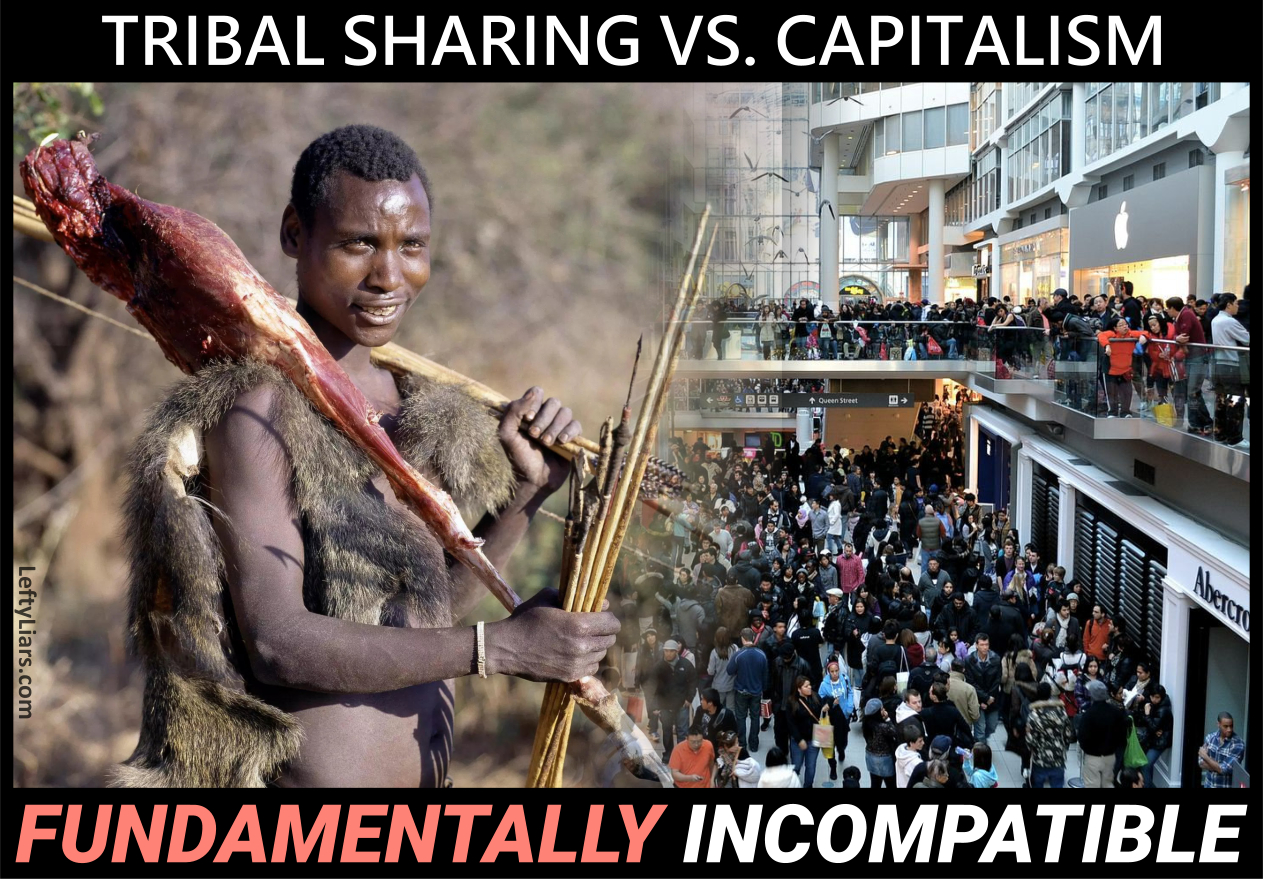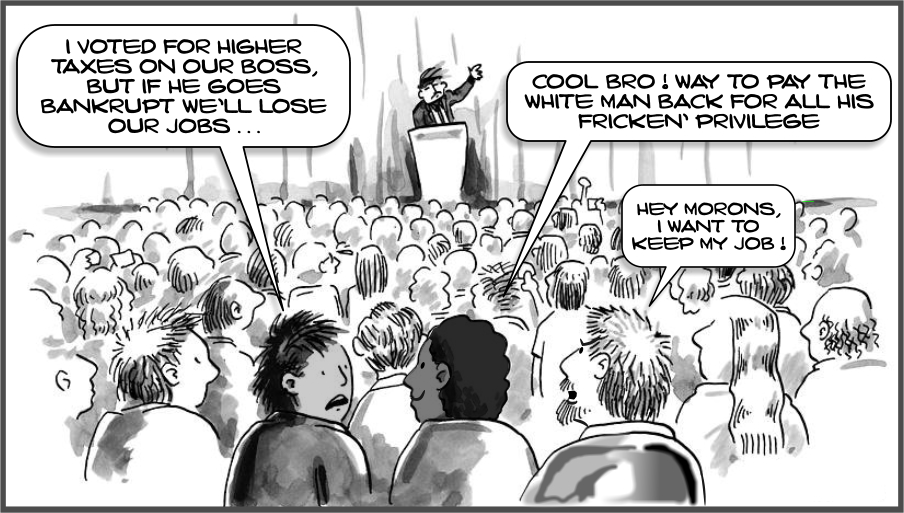

Some human populations are inherently left-winged, and this stems from their relatively recent tribal life where it was understood that everything was to be shared. For instance, this accounts for Africa, a continent whose countries are a chocolate box of tin-hat tyrant communist dictatorships masquerading as democracies, run by gangs and hooligans.
Tribal life, of course, dictates that all food is shared. You only have to watch ‘Naked and Afraid’ to see how one ‘tribe’ and another would react to a third tribes’ acquisition of plentiful food. They would immediately assume that since most of them were starving, the food should be shared. If one group, or worse still, one member, were to catch a large deer and not share it, there would be great resentment, hostility, and anger. In the real tribal world, such an act could easily lead to murder or war and often did.
Over thousands of years, European Caucasians evolved societies where wealth was accumulated across a broad spectrum by individuals, families, or groups. Asians did the same, as did various other human populations around the world. They had escaped the tribal world and entered into societies governed by the rule of law, which protected a person’s right to accumulate wealth.
Only by escaping tribal life and its restrictions could people develop better technology, science, medicine, and art. Consider how difficult it would be to design an invention while living in a tribe.
Scene: Tribe of 50, Norway, 30,000 BCE. Men prepare to hunt. Women look after children.
Øyðr: Let’s go.
Róðgeirr: What are you doing, Afkarr?
Afkarr: Working on this [holds up a wooden trapping device].
Kvígbiǫrn: Not that again.
Øyðr: What is it?
Jógeirr: He says it will help us catch animals.
Afkarr: It will. It works.
Ǫzurr: [Trudges over to look suspiciously at device] This will not please the gods.
Kýlan: You are bringing bad luck upon us, Afkarr!
Øyðr: Put away the toy, Afkarr. Our success is in God’s hands.
Afkarr: God blesses those who think for themselves.
Øyðr: Blasphemer! You have the gall to speak for God?
Róðgeirr: He is dooming us with his blasphemy.
Kvígbiǫrn: Our hunt is ruined before it begins.
Øyðr: I warn you Afkarr, you are…
Jógeirr: Let us vote. Who thinks Afkaar should be punished?
Øyðr: I count ten hands. So be it. Take him to the punishment tree.
Kýlan: And throw his toy in the fire.
Øyðr: Let this be a lesson to all. Do not interfere with the hunt.
Afkarr: You fools! You are destroying a great new tool!
Øyðr: Any more out of you, and we will cut out your tongue!
Kvígbiǫrn: He is tied and gagged. Let us go.
Kýlan: May the gods see how we have punished Afkarr and reward us.
Øyðr: Yes – may the gods help us in our hunt today.
Tribal society was the worst place to innovate, dream up new ideas, explore math, science, technology, or art because each member was expected to labor for the good of all daily. Any deviance from the norm could be used to blame bad luck on, and there was plenty of bad luck in tribal life.
Witch-doctors made things even more difficult as they were always looking for targets to label as witches, to blame unlucky events on.
“Kýlan is sick. I have thrown the sacred bones into the ashes, and it is clear what the spirits are telling me. Afkarr is a witch and has put a curse on Kýlan. We must torture and kill Afkarr to help cure Kýlan, and even that is not guaranteed because the evil is potent.”
If Kýlan subsequently recovered, the witch-doctor would be praised for his correct assessment. If Kýlan died, the witch-doctor would say, “At least Afkarr is not around to curse anyone else,” and receive gratitude for that. He could not lose, as long as he had the sacred chicken bones. Over millennia witch-doctors would morph into churches and priests, who would continue shunning science and innovation down through the ages.
When Europeans began moving out of tribes and into farming communities, villages, and eventually, large cities, enjoying freedom in their own houses, they could acquire and collect goods and objects of worth without being victimized. They could read, write, learn, teach, and innovate behind closed doors beyond the prying eyes of religious bigots and bullies. The tribe was no longer in their bedroom.
Coupled with the rule of law, this meant that a man could become wealthy, own the rights to make a product, sell it by the thousands and acquire vast sums of money. He could invest that money in other ventures and grow his fortune, to become fabulously well-to-do, and while doing so, employ thousands of people. His products or services would enrich society.
Where were the witch-doctors?
Down the road from the wealthy industrialist lived a priest, hell-bent on pressuring parliament to raise taxes on the rich. There were Leftist authors in the next street, writing anti-science novels like ‘Frankenstein’ [1818] by Mary Shelley, and anti-capitalist works, like The Communist Manifesto [1848] by Karl Marx and Friedrich Engels. Further up the road from them, unionists scuttled hundreds of industries, starting with mining and shipping, sparking a massive brain drain that would cripple whole nations.
Cartoonists mocked Darwin and cowpox vaccines, drawing pictures of Darwin as an ourang-outang, and cowpox vaccines causing cows to grow on people. Witch-doctors had morphed into churches, newspapers, political parties, unions, academics, and judges. Between them, they did their best to restrict any advances in science, technology, innovation, and wealth creation.
Socialism grew like cancer, giving us Stalin, Mao, Kim, and the National Socialists (Nazis) under Adolf Hitler. As a group, they murdered hundreds of millions and destroyed millions of innovators and entrepreneurs in the process.
Nonetheless, courageous individuals prevailed. Yes, the Left slowed their work, but they continued coming up with fantastic inventions that allowed businesses to blossom and grow. Like a garden persisting against weeds and insects, enterprises expanded, and capitalism provided a plethora of goods and services that made life happier and healthier for all.
Latest Tribal Descendants
While Anglo Saxons, Asians, and some other groups left their tribal existence many thousands of years ago, other populations did not.
What was your family tree doing a couple of hundred years ago? If they were tribal peoples in Africa, the Americas, Australasia, India, or elsewhere, they were accustomed to sharing. You probably think that riches should be shared between all people. This belief, that ‘redistribution of wealth’ is a good thing, came from your past tribal life.
Naked and Not Afraid
If you are a recent tribal descendant, you need to harness a new way of thinking about wealth and possessions that will bring you out of the Tribal way of thinking and into the Industrial Revolution way of thinking. Begin by studying the life your ancestors were living two hundred years ago. If you are an African American, concentrate on your African family tree, not your slave ancestors.
Whether such people lived in the Zulu tribe in Southern Africa, the Njuntundjara people in South Australia’s desert, or the Yanomami clan of Southern Venezuela, they shared food acquired in the wilderness they occupied. Natives understood their land, flora, fauna, and the weather back to front and were masters of hunting and gathering. They could create fire quickly and knew how to survive, keeping their weight constant in all terrain and weather. Sharing was a necessity in their world. They had little choice.
Naked and Afraid Billionaires
Imagine entering Jeff Bezos, Bill Gates, Warren Buffett, Bernard Arnault, Carlos Slim, Amancio Ortega, Larry Ellison, and Mark Zuckerberg in a Naked and Afraid episode. Perhaps you think they would not share since they are all rich capitalists, but you would be wrong. Rest assured, they would all help out in building huts, making fires, gathering wood, fetching water, and hunting. If one killed a pig, he would undoubtedly share it with the rest. In such circumstances, it is the best thing he could do for himself.
Insurance
He would share because it would ensure that others would help him in the future and share their food with him. It would be insurance for his uncertain future in that place.
Is that selfish? Yes, but everything we do is selfish. It has to be for us to survive. When a grandmother looks after her grand-kids, she does it because it gives her pleasure. If she gained no happiness from it, she would not do it. Which would you prefer – a selfish grandmother or an unselfish one? You better wish for the former because the latter would be a grizzly old cuss, not interested in you at all.
People do things either because they have no choice or because it gives them pleasure, even if that pleasure is so small an amount as to be hardly noticeable. You might absentmindedly rescue an ant in a pond and place it on a blade of grass, and forget the event five minutes later. How was that selfish? Believe it or not, you gained a small amount of pleasure from this activity, as you sympathized with the ant, and it felt good to help it. Nobody said the ‘pleasure’ had to be huge.
A reason for everything
People in tribes will gravitate towards sharing, whether it be Jeff Bezos, Carlos Slim, Mark Zuckerberg, or Donald Trump. They would need to share to increase their chances of survival in such a hostile place as the wilderness, naked, cold, flea-bitten, and hungry.
Now, for all you left-winged brown or black people whose ancestors were in tribes a short time ago biologically, what does all this mean? It means you have to haul yourself into the 21st Century and quit stalling. You have been fighting and bickering with whites about these issues now for a couple of centuries, and you are way past your due date to catch up.
Start by realizing that when you leave tribes to stay in city populations, where millions live, you cannot possibly be expected to share most of your money with everyone else. If your jungle tribe was five-million strong, would you share your pig with them? Good luck with that. Would you go and collect water for the five million? How about firewood? You share with a tribe because you know and depend on everyone there. In large cities, 99.999% of the population are strangers, many of whom you would consider enemies. Why would you want to share with enemies?
Even tribes would think that was foolish. Imagine if you and three others in your tribe were going through the jungle, and you came across thirty strangers who looked dangerous and sinister. Would you sing “Kumbaya” and insist on giving most of your food to them? If so, you may need a psychiatrist because normal humans do not behave that way.
Why would a population of millions, who need jobs, think an employer (businessman) should give them 60% of his money? Why bite off the hand that feeds you? That would be against all the principles of survival.

Everything changes when you leave the tribe. Nobody wants to share their wealth with millions of strangers unless it is a fair contribution that rewards the payer with services worth the money. Entrepreneurs provide products and services that improve our lives a thousandfold. The profits they make are plowed back into the economy, providing jobs and opportunities for millions. Their money does not sit idle. It is invested, which means it is loaned out to thousands of people who, in turn, can buy houses, start businesses, and so on.
Tribal sharing is fine for a tribal environment and even necessary there, but it is incompatible with modern urban life in first-world nations. Sharing, when applied to millions, is called socialism, and it fails every time. As it fails, it kills hundreds of thousands, who often die of hunger or disease.
If you are black or come from a tribal heritage, please learn that modern nations cannot exist using tribal sharing. It not only fails when applied on a large scale, but it kills. Learn to respect capitalism, democracy, and the rule of law. Oh, and start voting for Republicans.






